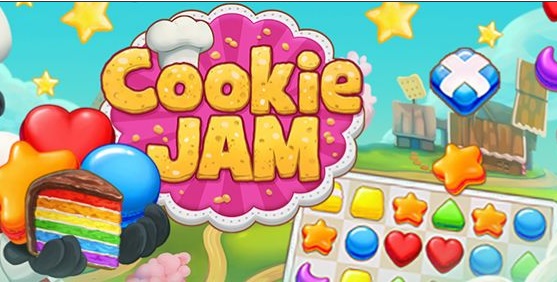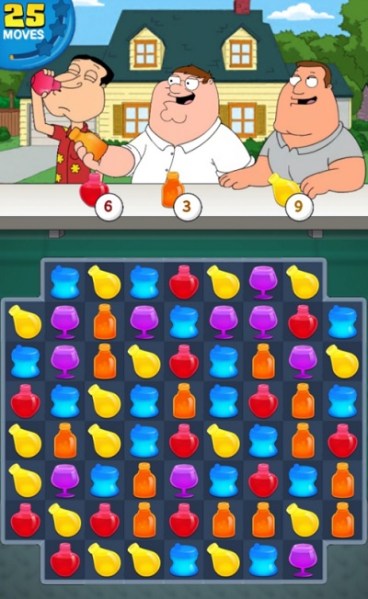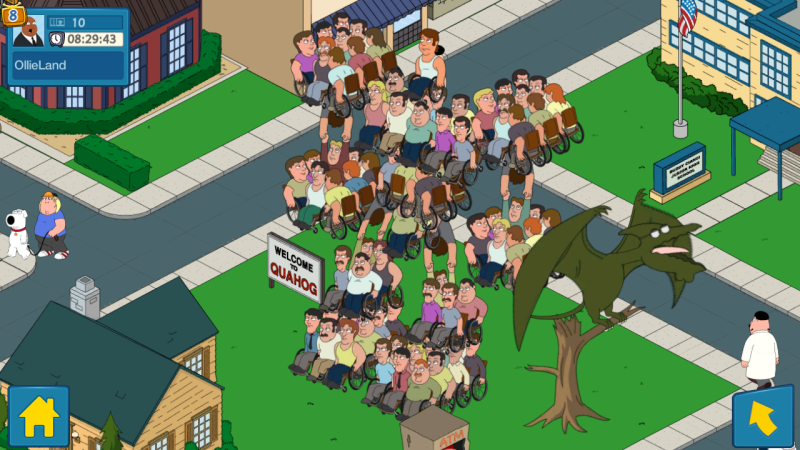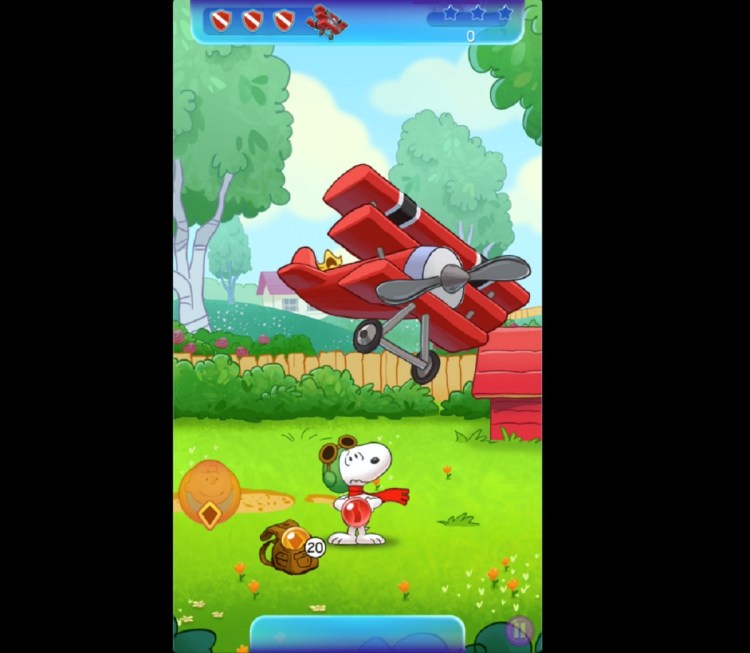
Above: Jam City’s Cookie Jam game
GB: Did NetMarble help you in any way that changed how you do things?
DeWolfe: They’re very heads-down with their IPO and have been for quite a while. They’re helpful in providing a board presence that understands what we go through on a daily basis. It’s almost like a symphony. You have game developers, game designers, artists, animators, and they all have to work in concert. Thing don’t always go how you think they will. To have a partner with a big seat at the table who understands what you’re going through in a board meeting is super helpful.
They’ll be helpful if and when we go through our IPO process, which we may do next year. We’re fortunate that we’re growing very rapidly and that we’re profitable. We can run our own race and choose when we decide to do that. If we do, they’ll have gone through it, and they’ll give us sage advice about what they did right and what they did wrong. We think their bar for quality is very high. We love being exposed to game mechanics that work in Korea. It’s always interesting to see what works in other countries and get their perspective on what may or may not work in Japan or China, because they’ve launched a lot of games in those countries.
We’ve been very successful in Japan, but we haven’t done so well in Korea or China. To get their experience in Korea and China has been helpful.
GB: Is Cookie Jam still the major game you’ve tried to do in China?
DeWolfe: Right. We did that through a publishing deal with NetEase. Quite frankly, it didn’t go that well. The game could have done great there and NetEase is a great publisher, but I think they’re a great publisher of male mid-core games. It was just a mismatch between the type of game they decided to publish and the type of game they had experience publishing.
With our future games, we’d love to work with Tencent. That’s our ideal partner to work with over there, but they don’t publish that many games. You have to deliver something special, which I think we have coming toward the second part of this year. We’ll be making an announcement on a very large IP game in the next 30 or 60 days. It’s one of the biggest IP in the world, and we’ll have the only mobile game associated with it. That could be very interesting for Tencent, but we’ll see. It’s very global in nature. Another one of our games that we haven’t announced is a casual game with deep mid-core features. They’re very interested in that. That may be a good candidate for release in China.
When you boil it all down, one thing we’ve learned from NetMarble is not to build a big team in China like some other companies have. They’ve gotten very distracted by the big shiny object, by 3 billion people. Your actual chances of making real revenues and real profits are quite low, unless you have a great publishing partner. We don’t currently have any revenues or profits forecasted for 2017 or 2018 from China, but that could change if we end up doing a big publishing deal with one of our new games coming out. The new game we launch in China will have to be a global IP. It won’t be like Family Guy or Futurama. It has to be something much bigger.

Above: Family Guy: Another Freakin’ Mobile Game
GB: There are still a few companies that publish even fewer games than you do. Machine Zone hasn’t done a new one in quite a while. King is maybe a bit more like you guys. I still find it odd that those kinds of leaders in the industry are still the most financially successful.
DeWolfe: We’re still at the top of the industry. We have a diversified portfolio, but we don’t have 15 games out there. We’re not like a Glu Mobile. It all depends on where you want to take your company. I don’t think you can take your company public with two games. I’m not sure what Machine Zone wants to do. They were interested in something to do with urban planning? I don’t know much about urban planning. Maybe their strategy works out really well for that. Supercell seems to do quite well with whatever they try. They make great games, and if they launch one of those every two years it seems to work for them, but I think they’re somewhat of a unicorn.
Cookie Jam is no slouch. It’s done more than half a billion dollars, and it’s hitting all-time highs in revenue every year. Our biggest and best team in our company is still working on Cookie Jam, building new levels and creating new events every week. They’re creating new features, new blockers, new power-ups, new advertising strategies within the game. By no means are we forgetting our library games. They’re some of our most important. Playtika is doing something similar. They’re not growing their DAU, but they’re growing their revenue.
There’s a much bigger focus on live game management – how you run your sales, how you run your events, getting those activities automated to the degree we can and running them as efficiently as possible – to increase retention. When you get really good at that, your games can be evergreen like ours, like Candy Crush, like Game of War, like Clash of Clans. All of these games have been in the top 25 for three years, at least.
We’ve expanded our capacity and done acquisitions. We think it’s smart to do acquisitions because it gives us expertise outside of our genre. The guys at TinyCo know how to build big storytelling builder games. They were the first ones to do that successfully with third-party IP with Family Guy. They’re doing it again with Futurama and another game we haven’t announced that’s going to be three times bigger than both of those combined.
Staying focused is the right plan. But you need to keep innovating and diversifying.

Above: The Quest for Stuff enables players to build their own versions of Quahog.
GB: Is there anything you’d like to say about the three games you have coming out, these three licensed IP projects?
DeWolfe: With Snoopy Pop, historically Jam City has had the number one bubble-popping games in the world. We’ve pioneered that type of game mechanic. This is going to be a bigger and better game than anything that’s ever been done in bubble-popping. It has the Snoopy IP associated with it, which has been tested with bubble-popping audiences. They absolutely love it. All the Snoopy characters are used. It appeals to a wide demographic. There’s a huge nostalgia factor to that game. Combined with the awesome game mechanics and how we interpret bubble-popping and power-ups, we think it’s going to be the biggest bubble-popping game ever. At least it could be as big as Panda Pop.
Futurama is in the works at TinyCo. It’s super authentic to the original show, the original characters. It has a massive fan audience built in. We have millions of preregistrations for that game. It’s going to hit the ground running. It’ll have a smaller audience to work with, but it’ll be a much more engaged audience that will be playing more often with deeper gameplay and storytelling. David X. Cohen and Matt Groening, the creators, are very involved. We’re giving fans a core game loop with the quests and the characters and the humor they want. It has elements from Simpsons, elements from Family Guy, but definitely deeper from a content perspective.
Family Guy is a match three game. Typically match three skews a bit more toward women. This is a match three game that both men and women can play. The hardcore Family Guy fan will want to play this game, because men are looking for an excuse to play a match three game. This is a match three game for them. It has great balancing, mechanics, power-ups, as well as a full storyline with all the characters from Family Guy. You get the match three audience and the Family Guy audience.
It’s a bit further out there on the risk scale. Normally you’d have cookies, candy, pastel colors in your match three game. Clouds and unicorns and all that. This is very true to the Family Guy story, to the essence of the original writing. It’s somewhat adult in its humor. You’re collecting and having fun with the characters while you play a match three game.
Each of these games take risks in their own ways. We like the different levels of innovation in all three.

